
|
| LOST & BURIED TREASURE!
By J. K. NESBITT edited by John Mitchell IS THERE BURIED treasure at Leechtown on Vancouver's Island? It is believed that $40,000 worth of gold nuggets in a knee-high leather boot covered with an inverted frying pan, 18 inches below the earth's surface. Today that boot of nuggets is worth over 3.6 million dollars... Leechtown is not a town any more, it is a collection of a few ancient shacks in the wilderness of Vancouver Island's beautiful Sooke district, about 20 miles from Victoria, out where the Pacific washes and lashes rocky shores. Now 147 years ago Leechtown was the scene of feverish gold excitement, and where is there a gold rush town that hasn't its buried treasure? Unlike the story of the fabled treasure of Cocos Island, which keeps cropping into the news, Leechtown's buried treasure hasn't been heard of for many years. W. T. H. Lubbe, one of the few remaining residents of Leechtown has recently been making a study of the fascinating story. Years and years ago, before he went off to the first world war. Mr. Lubbe did more than study the story of the treasure. He went digging for it the hard way. He and his pal, Paddy Dineen nearly broke their backs searching for the buried gold. "We put in many days looking for it and only got tired, shoveling," he says he still believes there is treasure buried in the earth at Leechtown. In any event, the story of the Leechtown's treasure is of the stuff romance is made of. Gold was first discovered at Leechtown early in 1864. Victoria was then filled with men who had searched, and found, gold in California and the Caribou. Within a few weeks Leechtown was a boom town. The rush attracted miners from California. In August of 1864 the vessel Sierra Nevada arrived at Sooke with more than 100 miners. The Victoria papers were filled with boosting stories of the great discoveries, how men were picking up gold nuggets out of the river. Here is an example. A Mr. James Deans wrote to The Colonist "on Thursday last, with a pick and shovel, I took out several pieces which were worth a dollar each. On Friday I took out between three and four dollars, on Saturday, after having got the rocker to work, I made $14.00 A Kanaka (a Hawaiian Islander) assured a Frenchman that he had a nugget worth from $40 to $50." now $3500. to $4500 In 1864 an assay of gold dust from the Leech River mines, made by Mr. Molitor for the Bank of British North America showed the value to be $18.40 to the ounce. The gold is of a rich yellow colour, resembling that from Australia." By September, when 500 men were in the camp, a paper said "a Mr. Hanley has discovered a large vein of cinnabar, apparently very rich, near Leech River." Soon Kennedy's Flats (named after Governor Arthur Kennedy of the British Crown Colony of Vancouver Island) was teeming with the excited life of a gold rush. Saloons and dance halls opened up, merchants sold liquor in tents, there were hotels with all-night roulette and poker parties. |
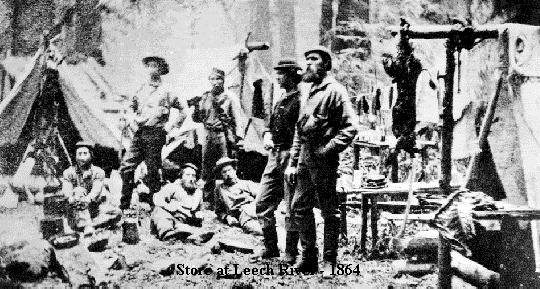
|
| By the late winter of 1864, so it is said now, more than 5000 persons were living in the rain-drenched camp.
The Leech River gold rush, however, was largely a myth a lot of money was taken out, it is true, but the gold rush there could never rank with California, Cariboo or the Klondyke. Yet, its story is a gripping one, filled with colour and wild stories of hectic frontier life. But in the early 1870's, a Wells-Faro stage was held up by a bandit in California and about $40,000 in gold dust taken. This, of course, was California gold and the bandit did not dare sell it to a California bank, as it would easily be recognized by any assayer there. So the bandit conceived the idea by no means an original one, of carrying his gold to a distant gold camp, hiding it, from time to time taking portions to the bank or government office, letting on, of course, that it was his find. Leech River was then in the news, it was not far from California, it was suitably isolated. To Vancouver Island went the California bandit with his ill-gotten gains. Since work was started on this story, Readers' Digest in its June edition published a story by Fairfax Downey, about buried treasures. It said that once Rattlesnake Dick Barter's Gang attacked a Wells-Fargo mule train in California and made off with $80,000. in Stolen gold, buried by bandits who did not live to retrieve it. The Leechtown buried treasure story is that the bandit set up a tent on the banks of the Leech River and had a good time in the liquor shops and saloons, with the young ladies in the dance hall. Until, one fine day, a U. S. marshal arrived on the scene with a warrant for the man's arrest. He was taken to California and died not long afterwards in Folsom or San Quentin. Mr. Lobbe says it was thought he made a death-bed statement to the warden as to the exact location of the treasure. |
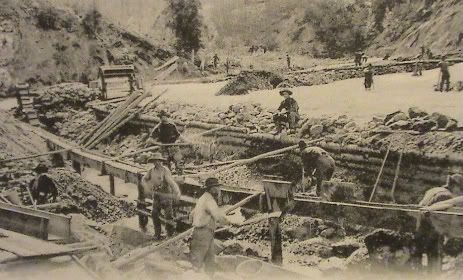
|
| Let Mr. Lubbe himself tell what he knows of the Leechtown treasure: "I first heard stories of the treasure when I was a small boy in the 1890's. A frequent visitor at our house was the late William Ralph. Sometimes my father would ask him how things were with him and what he had been doing lately. If old Ralph was reticent about talking, it meant only one thing that he had been out to Leechtown again, treasure hunting, and was not quite sure that he would not be laughed at for chasing wild geese, as some people of that day regarded all treasure hunting expeditions.
Ralph, a professional engineer, was thought to stand a very good chance of finding it, if it was still there." It was not until 1915, Mr. Lubbe says, that he again heard of the treasure, this time from a Capt. Martin who had been a prospector at Leechtown for many years and who had acted as an assistant to William Ralph. "Whereas Ralph had always been very reluctant to talk about this treasure, Martin was very loquacious and it was from him that I got the story and the supposed location of the treasure," says Mr. Lubbe. A DEATH-BED LEGACY But old Capt. Martin, Lubbe say, was a little bit confused as he lay dying on a hospital bed and divulged the location of the gold dust. He said it was buried 150 yards, or feet, or 250 yards or feet northwest from the northwest corner of the largest house in Leechtown. What was the largest house? It was either the Government office or the dance hall. Nobody knows for sure now, but both have been used to measure distance in the hunt for the gold. The story goes on that three men, one of them the warden to whom the bandit was supposed to have told of the location of the treasure, arrived at Leechtown and spent a week there. They had three pack-horses. When they departed they left their tools, picks and shovels behind them. They could have found the treasure and left in a hurry? But Lubbe thinks not. |
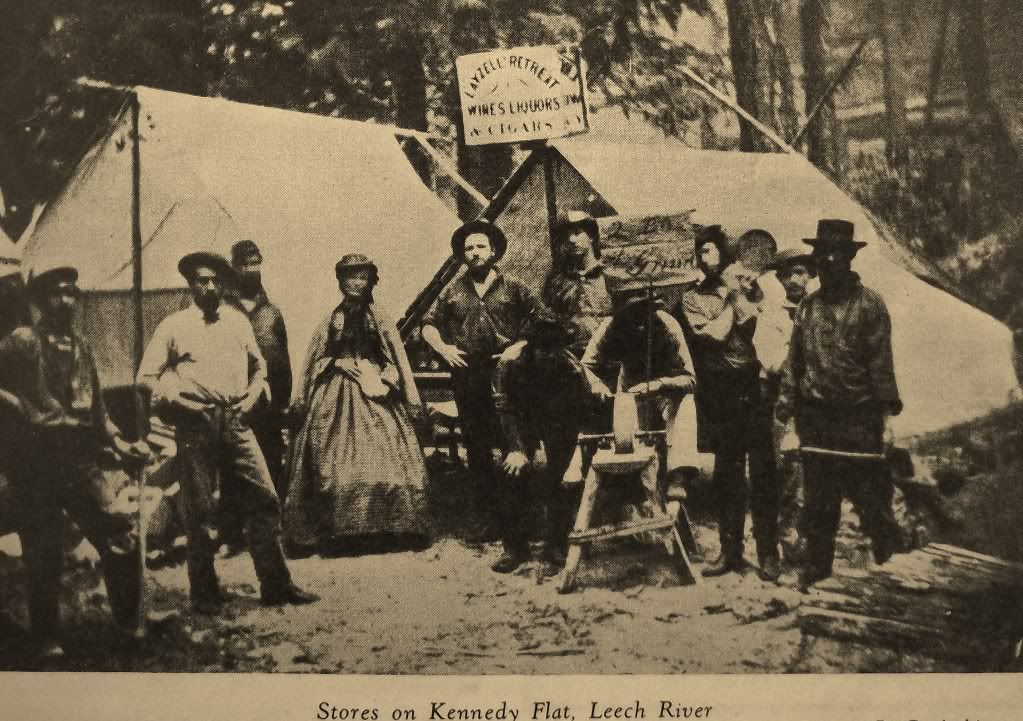
|
| "I would say that if the warden did not get it, it is still there," Mr. Lubbe says. "And if the warden had only the description as we know it, and had depended purely on precision or surveyor's methods, we can be assured that he did not get it; because precision methods are only good when based on precision work, which I do not think a man like the bandit could do."
Now how did old Capt. Martin learn of the location of the buried treasure? From Ralph, of course, when he was Ralph's assistant at Leechtown. Let Mr. Lubbe take up the tale again: "Where Ralph got it God only knows. The gold was supposed to be buried in a knee-high leather boot covered with an inverted frying pan, the bottom of the frying pan 18 inches below ground surface. All perfectly reasonable, as the robber could have buried it under the earth floor of his tent, without attracting attention. No mention is made of him having a pack animal, but he must have had one, as the gold would weigh about 170 pounds. The description fixing the location is very ambiguous. The bearing "northwest from the northwest corner" was it magnetic or true, a matter of 25 degrees." And how did Ralph learn of the treasure's location? That is more mysterious. As Mr. Lubbe remembers him, he was a very reserved man as regards speech, but he was a very good listener. He had a combined office and living room in Victoria over the saloon run by Tommie & Stewart on Yates Street and when he had nothing to do he would sit down by the hour in the saloon, saying nothing and drinking nothing (unless invited, says Lubbe) but always on the alert to catch a few scraps of conversation at the bar. When Ralph was surveying for the Esquimalt and Nanaimo Railway he made his headquarters at Goldstream House, from where the trail started through the woods to Leechtown. It was there the warden and his party arrived one morning on their way to Leechtown. There, every day, one of the party went for mail. Lubbe explains it this way: "If Ralph spent his evenings wall-flowering-as was his wont in the barroom where the only fire place in the house was he would have seen these treasure hunters and if they had become at all liquored up, he would probably have heard interesting scraps of conversation about treasure location." Ralph, in talk at the Lubbe house, had often said he did not believe the warden found the treasure. "Ralph never believed that the warden got it, and I know that Ralph did not get it, because my father, in company with Duncan Stewart was a co-executor of Ralph's will and the affairs of the estate showed no such sudden burst of prosperity. Old man Martin did not get it and I know that Paddy and myself did not get it." Ralph must have seen the California party departing from the Island, after their week's visit to Leechtown. Evidently he did not think they had found the treasure, because for years afterwards, as Lubbe remembers, he made trips to Leechtown with his instruments in search of it. Could be that there is gold buried in a knee-high boot covered with an inverted frying pan in Leechtown? Stranger things have happened. Just so ya-know none of these guys had a metal detector... |
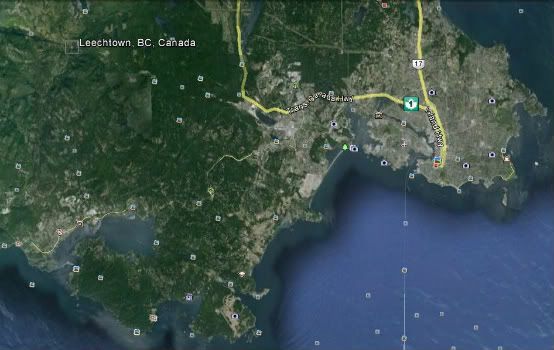
|
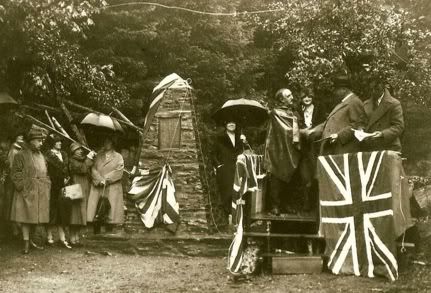
|
| This Rock Cairn Memorial was put up to commemorate this Gold Rush on Vancouver Island back in 1928... |

|
| The same Cairn Today... |
| More on Leechtown... |

|
|

